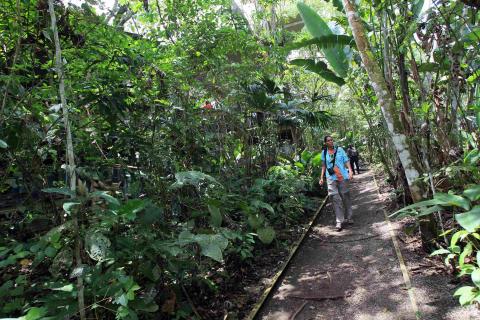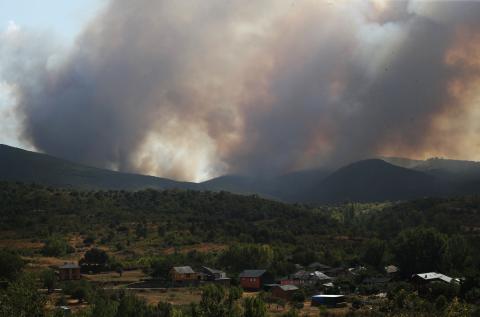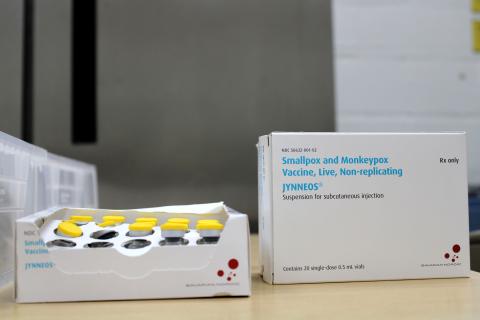University of La Laguna
If you are the contact person for this centre and you wish to make any changes, please contact us.
Distinguished Researcher (Beatriz Galindo senior) and leader of the research group Advanced Functional Materials and Nanoscience (AFM-NANO) at the University of La Laguna
Professor of Parasitology, Director of the University Institute of Tropical Diseases and Public Health of the Canary Islands of the University of La Laguna and CIBERINFEC researcher
Lecturer of Zoology at the University of La Laguna and president of the Iberian Association of Zoos and Aquariums
Professor of the Department of Animal Biology, Edaphology and Geology of the University of La Laguna
PhD in Psychology and Information Sciences at the University of La Laguna, professor at that university – now retired – and clinical psychologist
Lecturer in Psychobiology at the University of La Laguna
Associate Professor
Head of the Evolution, population genetics and paleogenomics research group

An international team has analysed data from more than 700 mammal populations in zoos since 1970 and concludes that there has been an ageing of the animals and a decline in females of reproductive age. According to the authors, this jeopardises the role of zoos in conserving endangered wildlife species and promoting global biodiversity. The findings are published in the journal PNAS.

Consuming up to four cups of coffee a day is associated with an increase in telomere length in people with severe mental disorders, such as schizophrenia or bipolar disorder. Telomere length is an indicator of cellular ageing and is shorter in people with these disorders, although the causes are not clearly understood. According to the study, published in BMJ Mental Health, the effect shown is comparable to ‘a biological age five years younger’ in coffee drinkers.

Around 840 million women worldwide — nearly one in three — have been victims of physical, psychological or sexual violence by their partner or have suffered sexual violence outside of their relationship, a figure that has barely changed since 2000. This is one of the conclusions of a report led by the World Health Organisation (WHO) that analyses data from 168 countries between 2000 and 2023. For the first time, the study includes estimates of sexual violence outside of intimate relationships: 263 million women have suffered this type of assault since the age of 15, a figure that, according to experts, is well below the actual number.

The Pan American Health Organisation has maintained its epidemiological alert for Oropouche fever since it was first issued in February 2024. Although the virus only circulates endemically in the Americas, the importation of cases to Europe following international travel is keeping health agencies and authorities on alert.

Several areas in the region of El Bierzo in León and the province of Zamora have seen numerous forest fires in recent hours, forcing more than a thousand people from different municipalities to evacuate. One person has died. The flames have affected the Las Médulas natural area, listed by UNESCO as a World Heritage Site. Another fire in Tarifa (Cádiz) has forced the evacuation of hundreds of people, and also in Tres Cantos (Madrid), where one person died. In addition, there are active outbreaks in several areas of Galicia. The government declares a pre-emergency phase.

The Member States of the World Health Organisation (WHO), meeting on Monday in Committee A of the World Health Assembly, approved a resolution calling for the adoption of a historic global pact to make the world safer from future pandemics. On Tuesday, the Assembly, in plenary session, adopted by consensus the world's first agreement on pandemics.

Research published in The Lancet estimates that 18.9% of women and 14.8% of men worldwide experienced sexual violence before the age of 18. The study, conducted in 204 countries from 1990 to 2023, identified significant differences between countries and regions. The authors highlight the difficulty of distinguishing whether these variations are due to real differences or to unequal levels of reporting. In Spain, the figures obtained in this systematic review are 10.8% for girls and 12.2% for boys.

The new US president, Donald Trump, announced on his first day that the country will leave the World Health Organisation (WHO) within the next twelve months. The reasons behind the decision, according to him, are the ‘mismanagement of the covid-19 pandemic and other global health crises’, as well as ‘disproportionate payments compared to other countries’ dues’.

With the increase in cases of mpox, the European Union's Health Security Committee met on Monday. According to the Ministry of Health, the meeting concluded ‘with recommendations very similar to those previously issued by the WHO and the ECDC’. The risk of the likelihood of mpox spreading to the general EU population is currently considered to be ‘low’, although it increases in populations with close contact with diagnosed cases and in particularly vulnerable people. Further imported cases in the EU are not excluded and vaccination of the general population is not recommended. In addition, the HSC does not recommend border control.

24% of girls aged 15 to 19 who have been in a relationship have experienced physical or sexual violence by a male partner at some point in their lives, according to a global study with data from 161 countries between 2000 and 2018. Spain is in the group with the lowest prevalence (12% over their lifetime; 4% in the previous year), according to 2015 data. There is less violence against girls in countries with higher incomes, higher rates of girls in secondary education, and greater gender equality in inheritance laws, says the study published in The Lancet Child & Adolescent Health.